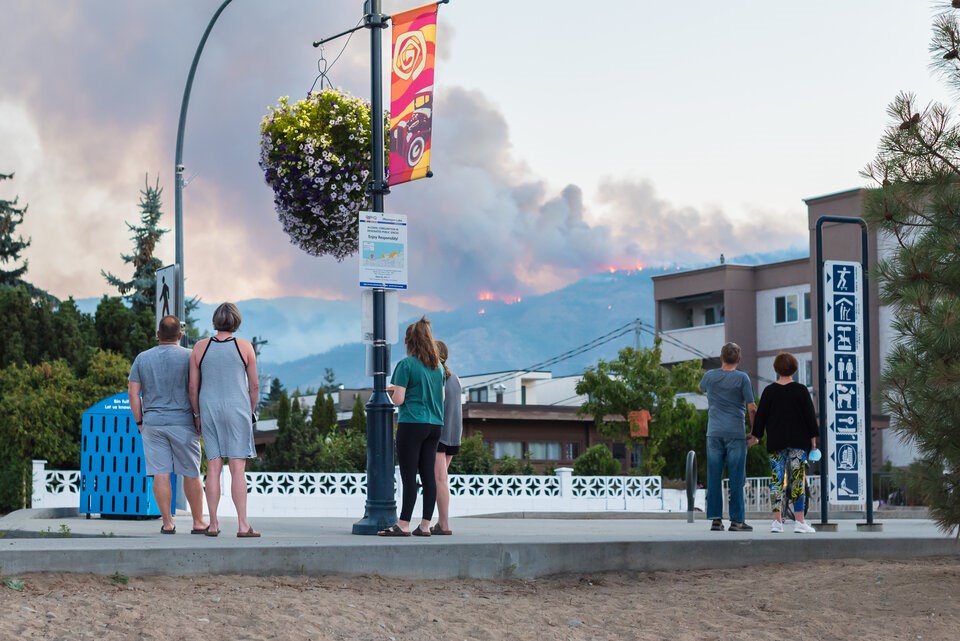A global analysis of nearly 2,100 disruptions to mass gatherings and events over 20 years shows climate change is a major cause of cancellations, delays, and modifications, with Canadian sporting events particularly hard hit.
Published in the International Journal of Disaster Risk Reduction, the study analyzed 2,091 sporting and business events, as well as festivals and other mass gatherings across 54 countries between 2004 and 2024. The results show a rising pattern of disruption, often driven by storms, wildfires and heat.
Lead author Shawna McKinley—an instructor at the B.C. Institute of Technology—said she and her German, Japanese and Australian colleagues relied on a vast trove of data, including archive research, RSS feeds from event organizers and news media, social media surveillance and interviews.
Many of the analyzed events involved arts, culture or entertainment; others were centred on business, education, government or sports. Galas, festivals, parades, races and theatre events were also included.
The researchers then overlapped event disruptions with rapid attribution studies linking extreme weather with climate change. The results painted a portrait of mass gatherings colliding with extreme weather intensified by human-caused climate change.
They found 57 per cent of the disrupted events faced weather that was made more severe or more likely as a result of human-caused climate change. Another 12 per cent of the affected events were correlated with long-term trends in global climate change. One per cent were linked to research that showed inconclusive or no connection with climate change, and 31 per cent of disrupted events were found to have “essentially no data.”
“For a long time, the event industry has had this sense that things are getting worse, more uncertain, difficult to manage,” said McKinley, adding industry can now say, “yes, it is.”
Canada’s sporting events stand out as uniquely vulnerable ahead of World Cup
Most of the data came from the U.S., U.K., Australia and Canada.
In North America, storms typically caused disruptions on the East Coast, while wildfires and their smoke mainly affected the West Coast. Among all analyzed countries, Canada was most severely impacted by wildfires and smoke, which accounted for 39 per cent of its event disruptions.
Globally, festivals and concerts were found to be hit hardest, representing 38 per cent of reported incidents.
Marc Lee, an economist with the Canadian Centre of Policy Alternatives who was not involved in the research, said the study likely underrepresents the impact of climate change on events.
“I think it just reinforces the idea that in the 2020s, nowhere is safe. No matter where you are, a flood could come in, a wildfire could burn through town or a heat wave could kill your grandmother,” said Lee.
An avid concertgoer, Lee said a lot of music festivals are already on the financial margin to begin with, and if insurance rates go up, it might make them impossible to hold.
“I think there’s a risk we see a decline in these events,” he said. “I think for the most part, people aren’t thinking about these things. It’s rolling the dice.”
He added: “There is risk of death, of getting sick, getting injured.”
Events disrupted by climate extremes have gone up in recent years, climbing 86.5 per cent between 2023 and 2024. The researchers also found extreme heat was the fourth most common cause of reported event disruption in 2024, up from sixth a year earlier.
The Canadian results show its sporting events were uniquely vulnerable, with races, tournaments and matches accounting for a third of all disruptions.

The research comes less than a year ahead of the 2026 FIFA World Cup, which will be held in cities across Mexico, the U.S. and Canada.
The global soccer tournament is usually hosted in the summer months of June and July. Last week, scientists warned that without scheduling changes, extreme heat could threaten players and fans—risks that were previewed during the recent FIFA Club World Cup, when extreme heat and thunderstorms forced some games to be postponed.
In response, the global soccer governing body said it would adjust its extreme heat protocol. The new rules gave players extra breaks during play, more field-side water, and cooled team benches with fans and more shade.
Despite the measures, Chelsea midfielder Enzo Fernández said he felt dizzy during play earlier this month in New Jersey, and called on FIFA to avoid afternoon kickoffs when the 2026 tournament launches next year.
As the 2026 FIFA World Cup draws closer, Lee said the study raises questions for organizers, both in Vancouver and other event locations across North America.
“This is a real thing. It’s happening. It looks like it’s happening more frequently now than it was five years ago,” said Lee. “If there’s wildfire smoke, what’s our course of action? If there’s extreme heat, what’s our course of action?”
Lee: “This should at least get them thinking.”
A growing financial toll
Across Canada, a number of other iconic winter events have been forced to change or cancel their plans in recent years.
In 2024, the PwC Tremblant World Cup in Quebec and the World Pond Hockey Championship New Brunswick never went ahead.
The BeaverTails Ottawa Ice Dragon Boat Festival, meanwhile, was cancelled for a third year in a row due to a lack of ice on the Rideau Canal. The cancellations are estimated to have cost at least US$2.8 million and, according to McKinley, are emblematic of a country where many events rely on the presence of snow and ice.
B.C. is among several Canadian hot spots for event cancellations, according to the researcher's findings. That included the 2024 B.C. Winter Games, which cancelled its ski and snowboard events that February after a lack of snowfall at the host mountain near Quesnel prompted several sporting organizations to pull out.
Alison Noble, president and CEO of the BC Games Society—the group that oversees the BC Summer and BC Winter Games—acknowledged climate change is a growing concern for anyone organizing a sporting event. She said her organization consults athlete groups and provincial health authorities to ensure safe conditions, and does whatever it can to mitigate risk due to changing conditions.
“The world around us is shifting and it’s unpredictable,” she said.
Noble did not provide any estimates on how much money was lost in the 2024 cancellations.

McKinley, who has spent years consulting companies on how to host sustainable events, said her research team was unable to track the total cost of climate-driven disruption across all the tracked events because organizers tended to measure losses differently or kept financial data private.
“There's no magic total,” said McKinley. “But the takeaway is that we know that the results financially can be severe.”
Where they could, the researchers documented direct damage to event organizers. For example, in 2017, the Shambhala Music Festival in Salmo, B.C., was partially cancelled when attendees were forced to evacuate due to wildfires at an estimated cost of US$353,000.
Many of Canada’s event disruptions came in the summer of 2023, when a record wildfire season affected 57 events.
In the town of Sorrento, B.C., that year’s wildfires upended the Nimble Fingers bluegrass festival, causing US$24,000 in food losses alone.
Wildfires and smoke also led to the cancellation of the Mont-Tremblant and Penticton Ironman marathons in 2023. About 5,700 competitors were impacted, with organizers and local economies losing a combined US$25 million.

Some event organizers have already moved to adapt to the changing threats. B.C.’s Salmon Arm Roots and Blues Festival was impacted by heat, smoke and wildfire six out of eight years leading up to 2023. But in 2024, the organizers shifted the timing a month earlier to avoid disruptions.
The BC Cancer Foundation, meanwhile, was forced to permanently end its flagship Tour de Cure event. Serving as B.C.'s largest cycling fundraiser for years, the foundation had raised $131 million over 16 years. But organizers said they were forced to end the ride amid rising costs and multiple years of heat, smoke and rain exposure.
Dave Sawyer, an economist at the Canadian Climate Institute who was not involved in McKinley’s study, said the rising toll climate-driven heat and wildfire smoke is having on people is starting to dominate economic damages during extreme weather events.
He pointed to one five-day period in 2023 when smoke was estimated to cost the province of Ontario $1.28 billion—a combination of everything from increased premature mortality to decreased economic productivity due to lost worker days.
“It’s not some down the road, next generation problem. It’s real today,” said Sawyer. “You get this drag on economic activity, this drag on human health.”

B.C. bears brunt of Canadian disruptions
In the past two decades, British Columbia faced 74 of Canada's 217 climate-disrupted events, surpassing California and placing it third in North America behind the U.S. northeast and southeast.
Some of B.C.'s disrupted events directly overlapped with extreme weather that was later scientifically attributed to climate change. That included 14 events during 2021 flooding and 40 caused by wildfires between 2017 and 2023.
Among North American cities, climate-related event disruptions were most common in New York City, though Calgary, Kelowna and Halifax all ranked within the top 21.
“We definitely see that there's a burden borne by the West,” said McKinley of the Canadian results. “You have both B.C. and Alberta that are affected by heat, by drought, by wildfire, by air quality, by extreme storms.”
Elsewhere in Canada, McKinley said she was most struck by stories of wildfire and smoke in the Northwest Territories, where in 2023 everything from a national table tennis tournament to essential government services and a First Nations assembly were cancelled. Territorial elections that year were delayed for six weeks.
“You feel the cancellation more in those remote communities,” she said, “Because they're sort of essential parts of the community fabric.”
To McKinley, the results of the study suggest organizers need to take a more proactive approach in planning for potential disaster. She said preparing for the rising impact of extreme weather should be done alongside re-evaluations of overall risk-planning, including moves to prevent violent attacks like the one that occurred at Vancouver’s Lapu-Lapu Day Festival earlier this year.
That could include more medical and security professionals on-site as well as staff and equipment to monitor air quality. It may also require more regular planning for alternative indoor venues or measures to curtail activities for vulnerable athletes, performers or spectators.
“I think that it was a real wake-up call,” she said of the 20 years of data. “And I'm not sure that we have it completely figured out.”
—With files from the Associated Press



